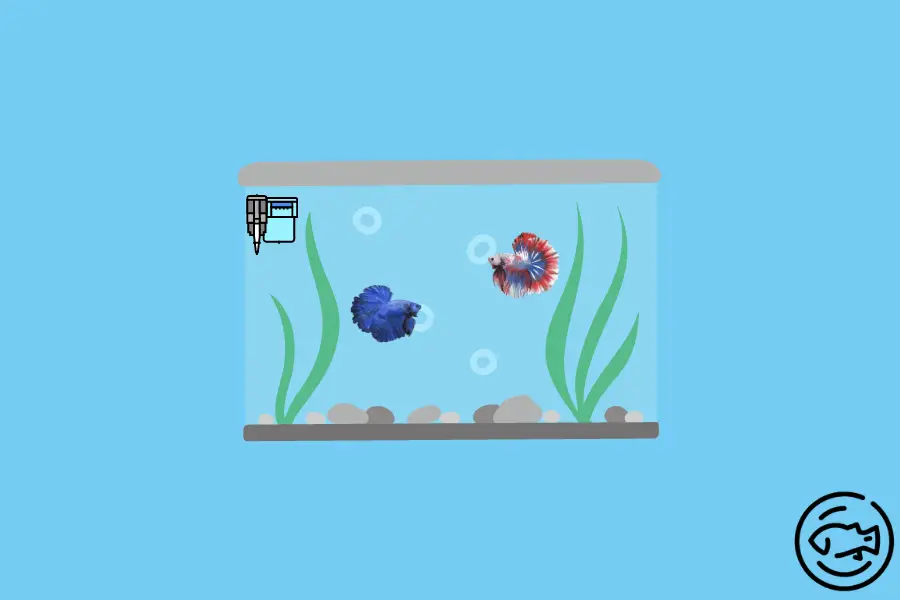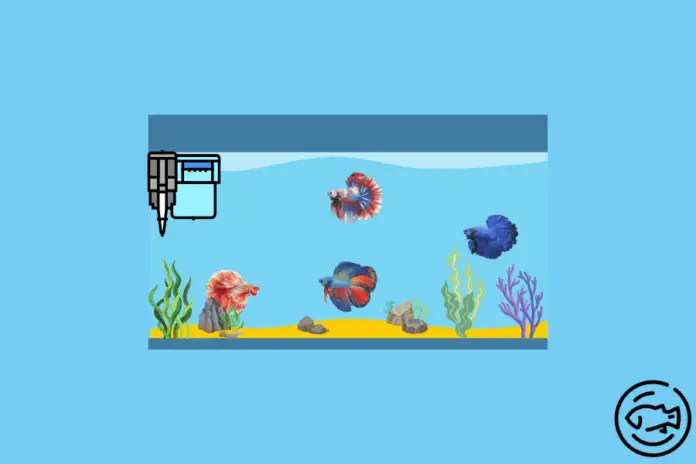Every aquarium owner aims to guarantee their fish enjoy a long and flourishing life. A crucial method to achieve this is by ascertaining that their tank is adequately filtered. But the question arises, how long can a Betta fish live without a filter?
A domestically bred fish can manage without a fish filter for approximately 3 days to a maximum of a week. However, this is contingent upon the dimensions of the tank, the quantity of fish, and the frequency of water replacements.
At this point, you can bypass the necessity of a filter by increasing the frequency of water changes.
Even if you change the water daily, your fish will resemble a destitute little child attempting to swim against the current!
Betta fish may live without a filter, but it may impact their lifespan, as the lack of a filter could lead to deteriorating water quality and heightened ammonia and nitrites, which can cause distress and harm to your betta fish.
Regular water replacements and consistent maintenance are suggested to maintain the well-being of your betta. Ignoring these procedures could potentially shorten the life expectancy of your betta fish.
In this article, we’ll thoroughly discuss how fish can survive without a filter and offer guidance on maintaining your fish in peak health.
Factors Affecting How Long Can A Betta Fish Go Without A Filter

The survival duration of fish without a filter is constrained to various elements. These factors dictate how long fish can endure without the assistance of a filtration system.
Water conditions, such as the concentration of ammonia, nitrites, and nitrates, play a pivotal role in a fish’s ability to thrive without filtration.
Other factors like the size of the aquarium, the number of fish, and their overall health also affect their survival without a filter.
Aspects of the environment, such as temperature and oxygen levels, further impact fish survival in a tank lacking a filter.
Fishkeepers can make knowledgeable decisions about their aquarium maintenance and fish health by considering these factors.
How Long Can A Betta Fish Live Without A Filtration System?
A lack of a filtration system can result in swift water quality degradation, causing oxygen levels to drop and ammonia and nitrate levels to rise.
Consequently, the fish may undergo stress, weakened immune systems, and an increased susceptibility to diseases.
Fish can potentially survive without a filter for a span of 3 days at the least to a maximum of 7 days. Nevertheless, the duration they can endure without water sanitation hinges on several variables.
These determinants encompass the fish species, the quantity of fish occupying your aquarium, and the acidity and bacterial concentration in the water. Other considerations involve alternative filtration strategies you’re implementing and the resources at your disposal.
Though some sturdy fish species can last briefly without filtration, providing fish with a proper filtration system is generally advised to ensure their long-term health.
Moreover, maintaining fish without a filtration system requires frequent and meticulous water replacements to uphold optimum water quality, and without a filter aiding the natural nitrogen cycle, fish owners must regularly test the water and manually remove waste to prevent contamination.
Close observation of the fish for signs of distress or illness is also needed. A more balanced ecosystem and improved water quality can be achieved by providing an appropriate habitat, including suitable decoration and plants.
Other factors, such as the size of the tank, the stocking density, and the presence of live plants, can influence the amount of waste produced and impact water quality.
Contemplating these factors will help ensure the longevity and well-being of your fish.
Can You Switch Off A Pond Filter?
Open-air ponds require filtration more than those in an aquarium setting. You should only deactivate the filter for a short period, such as a few hours, during maintenance or cleanup tasks. This action is necessary to guarantee that the water condition in your pond does not deteriorate excessively.
Here is a four-step guide to help you decide if and when you can turn off a pond filter:
- Evaluate Water Quality: Before making a decision, examine the current condition of your pond or aquarium water.
- Reflect on Pond Size: The size of your pond significantly affects whether you can switch off the filter. Turning off the filter is generally not advised for small ponds with limited water volume.
- Consider Environmental Factors: Elements such as temperature, sunlight exposure, and the presence of plants or livestock in your pond can influence water quality. Take these factors into account before deciding to turn off the filter.
- Consult with Experts: If you need more clarification about turning off your pond filter, contact a professional or trusted local pond specialist for personalized advice based on your circumstances.
The decision to switch off a pond filter should only be made after considering the unique attributes of your pond and seeking expert advice if necessary.
also read: How To Clean A Turtle Tank – A Comprehensive Guide
What Are The Consequences Of An Unfiltered Fish Tank?
The absence of a filter in a fish tank can lead to severe consequences for the aquatic environment, summarized in three main points:
- Decreased oxygen levels due to poor water quality
- Accumulation of toxins, causing stress and health problems for fish
- Uncontrolled growth of harmful bacteria and algae
Without proper filtration, the water quality quickly deteriorates as waste, uneaten food, and decaying matter pile up. This results in reduced oxygen levels, creating an unhealthy environment for the fish.
Moreover, an unfiltered tank becomes a breeding ground for toxins such as ammonia and nitrites, which are harmful to fish. Exposure to these toxins can cause stress and respiratory issues and even result in fish fatalities.
Furthermore, the absence of water circulation and filtration encourages the growth of harmful bacteria and algae, further compromising the health of the fish.
Historically, early aquariums also suffered from poor water quality due to the lack of efficient filtration systems.
However, with technological advances and an increased understanding of aquatic ecosystems, various filtration methods have been developed to mitigate the consequences of an unfiltered fish tank.
Conclusion
The life expectancy of a betta fish without a filter hinges on various elements, such as the quality of the water, the dimensions of the tank, and the quality of overall care.
While a few betta fish can endure a brief span without a filter, it’s typically not suggested for their long-term vitality and wellness.
To secure the long life of a betta fish, it’s recommended to provide them with a suitable filtration system. This will assist in eliminating detrimental substances from the water, fostering oxygenation, and sustaining a favorable environment for their overall well-being.
FAQs About How Long Can A Betta Fish Live Without A Filter?
- How long can a betta fish live without a filter?
A betta fish can live without a filter for about 3 to 7 days, depending on factors like tank size, fish population, and water conditions.
2. What are the consequences of not using a filter in a betta fish tank?
Choosing to forego a filter in a betta fish tank can lead to less-than-ideal conditions and health issues for the fish. Without a filter, harmful bacteria and toxins can build up in the water, forcing stress and potentially harming the betta fish.
3. What role does the fish population play in the need for a filter?
The more fish you house in your betta tank, the more waste they’ll produce. Consequently, the water will dirty quicker, necessitating a filter to remove toxins and maintain water quality. It’s best to avoid overcrowding your tank to minimize the need for a filter.
4. Can tank maintenance affect how long a betta fish can go without a filter?
Yes, proper tank maintenance is crucial for the health of a betta fish, whether you use a filter or not. Regular water changes, gravel vacuuming, and ensuring proper water flow can help remove debris, waste, and toxins from the tank, thus improving the conditions for the fish.
5. Are there alternative filtration methods besides using a filter?
Yes, alternative filtration methods for a betta fish tank include:
- Using live plants to remove toxins and oxygenate the water.
- Using an air stone to create water circulation.
- Using a protein skimmer to clear debris and toxins.
These methods can help maintain water quality even without a traditional filter.
6. How does tank size affect the need for a filter in a betta fish tank?
Tank size is a significant factor when determining the need for a filter. The limited water volume in smaller tanks leads to a quicker accumulation of waste and pollutants. Larger tanks, on the other hand, offer more water volume for dilution and stability, allowing a more extended period without a filter. Nevertheless, proper tank maintenance remains essential regardless of tank size.



